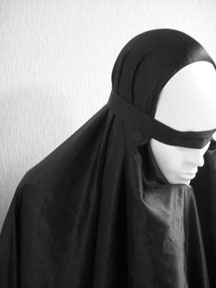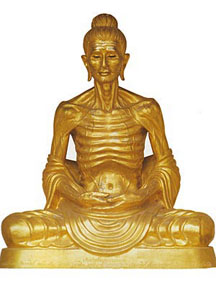
Asceticism has come to be characterized in contemporary culture as an extreme form of religious practice; in particular, as a retreat from society, and as an even more extreme form of self-denial. We may conjure up an image of a monk sitting on a dirt floor, ribs protruding, eyes sunken, and beard infested with insects. Or, we may imagine a hermit living deep in the mountains, having not spoken to another human for many years, living only on the few sparse foods he can obtain from nearby foraging and hunting. Even sources such as dictionary.com, one of the most-used internet references, defines asceticism as "rigorous self-denial; extreme abstinence; austerity." Merriam-Webster's dictionary comes closer to the original meaning: "practicing strict self-denial as a measure of personal and especially spiritual discipline." Somehow, people have come to substitute "extreme" for "strict" thereby diminishing the meaning, and importance, of asceticism for the spiritual aspirant, giving it the umbra of belonging to the domain of the crazy person. As our modern culture continues to be influenced by the popular impressions of general populations of people, so will the depth of understanding of complex spiritual practices continue to decline.
Asceticism for the Chan Buddhist is better understood as a practice of detachment that is initiated by an individual to help him or her overcome pain and suffering (duhkha): as a practice that brings spiritual insight - peace and bliss -- into a life that longs for it.
Just as the quest for spiritual-insight manifests in every degree of "intensity" from the not-at-all interested to the deeply interested, so does asceticism. In its essence, asceticism is simply a practice in which we deny our ego-selves gratifications. In Chan, ascetic practices are used to help us detach: detachment being the Buddha's most important, and explicit, instruction to those of us interested in pursuing a life free of pain and suffering. To detach from an object of desire is, as long as our ego-self is at the helm, to practice self-denial. Because detachment can be so difficult, especially at the beginning of our journey into Chan, we force ourselves to some level of "strict adherence" to a personally-enforced code of self-denial: that is, we must accept some degree of an ascetic life.

The astute reader may say, "But Zen is not called the ‘Middle Way' for nothing! We don't do extremes!" Yes indeed. We don't do extremes - we don't mutilate ourselves, we don't fast until we're skeletons, we don't eat only food that is given to us in our alms bowls ... these "extreme" ascetic practices are not part of the Zen way. But ascetic practices do not need to be extreme either. Most everybody beginning on Chan's journey needs some degree and form of ascetic practice in order to initiate the process of detachment from our worldly, conditioned, lives. To what degree, however, is an individual thing, depending on our own disposition, willpower, and eagerness to "cross the boundaries." It may begin with us tossing out our electric razor in favor of our old-fashioned mechanical razor, or it may begin with us selling all our possessions, giving the money to charity, and disappearing into the mountains. All are valid, all are valuable as long as we have gauged correctly our needs.
This means we must have some gauge to evaluate ourselves for the degree of asceticism needed - if we recall, the Buddha's own instruction was to detach - detachment is the key we need to unlock the gate to nirvana - freedom from desire. If we need to physically remove ourselves from our daily routines, from our cars and TVs and computers, in order to detach from them, then that is what we, as Buddhists, are obliged to do. If we need to retreat from society for a while to "get our bearings," to clear our minds and discover our Selves, then that is what we must do. From personal experience, and from speaking with others, this gauge seems to be an inner feeling, or even command, directing us toward a specific action. There is an associated feeling of "rightness" about it, and the sense of "rightness" is amplified once we have set off on the course.
Our course may be mild, or it may be extreme. If our inner voice tells us to sell all our belongings in order to detach from them, then that, too, is what we must do if we are truly dedicated to following a Zen path ... but it all depends on us. If we are adequately strong-willed and can detach without discarding, then detachment has been accomplished: we can live with our things without attachment to them. But if we must discard in order to detach, then we do it and accomplish detachment this way -- as long as we do not "long" for those things we discarded. If we discard and end up craving our discards, then the process of discarding did nothing. We must remember that asceticism is a method to achieve a goal, and that goal is detachment. We don't follow a path of asceticism in order to do Zen, we follow the path of asceticism in order to detach.
But ridding ourselves of our belongings is done not just to detach from them, but to enable us to gain something valuable. We may, for example, sell our car in order to force ourselves to walk more, or ride a bike more. We gain improved health, contribute less to global warming, and become more in-tuned to the earth. Or that valuable something may be connecting to our Buddha Self, as illustrated by a cleric of our Order who decided to toss out his shoes in favor of walking barefoot. A fellow cleric who knows him well writes: "He has not worn shoes for over six years. He carries a pair of zories (thongs) in his hip pocket to satisfy restaurant managers when needed, but otherwise they stay in his pocket. He hikes barefoot and just recently completed a summit ascent of Mount Lassen in California. He feels that he knows the earth far more intimately than anyone ever could who wears shoes." So, can we say he ridded himself of shoes in order to detach from them? No. His intent to tread the earth barefoot is in the pure spirit of Zen - to uncover that which is unknown - to connect with the earth in a direct, physical, way that connects the psyche - our spiritual selves -- to the earth, and thereby back to our Selves. With great personal insight, he recognized that his shoes were a barrier to Self-knowledge.
How many of the "things" we own, the activities we do, are barriers to knowledge, to "connection"? One of my favorite sayings in Zen is "leave no stone unturned." We investigate everything - look under every stone - so as not to miss anything. Letting go of our "stuff" -- of our conditioned ways of doing things -- is, ultimately, the only way for that process to happen fully. When we don't, we get stuck. And the moment we get stuck, we're not doing Zen. We may be living our lives, but not as fully, wisely, and happily as we could.
Asceticism takes on different forms depending on where we are on the spiritual path. In the beginning, we make modifications to our life in order to simplify our life. A simple life gives us the time and space we need to accomplish the hard labor of spiritual work. In the middle, asceticism gives us the freedom we need to go deeply into our Self which we have discovered from our early forays into detachment. At a later stage, asceticism vanishes and is seen only as a vehicle that got us where we are - a place of no-self, of no-separation. Car or no car, there is no difference. House or no house, no difference. When the self has been fully transcended, asceticism has no meaning - there is nothing to deny to something that has no dependency for us. Asceticism depends entirely on a dominant ego-self. It depends on our having a sense of separation, of personal identity, and of a longing to transcend that condition.
On the flip side of the coin, a challenge arises for many practitioners when they become attached to their ascetic practices. As mentioned, attachment creates our sense of individuality, of separation. As long as we're attached to anything, even an ascetic practice, we can become stuck. The ascetic practice becomes our identity and we halt there. The moment we become stuck, we stop doing Zen, and this can happen at any stage of the spiritual journey. The important thing is to become aware of being stuck and then that we take action to get unstuck.
We use an ascetic practice as long as we need it, but once it starts feeling too comfortable and if we have become dependent on it, we must discard it and move on. Only in this way can we be assured that we keep moving forward, that we continue climbing the mountain. In those cases when an ascetic practice has become comfortable yet it's no longer serving as a means for detachment because it has already served that purpose, we may equally choose to continue with it, or not, as long as we are not attached to it. In such an instance, taking and leaving are equal and silent partners.
"If you wish to find a place where you can rest,
Cold Mountain for long can keep you secure.
A slight breeze blows through secluded pines;
The closer you get the better it sounds.
Underneath is a man with graying hair;
Mumble mumble - he reads Huang-ti and Lau-tzu.
Ten years he's been unable to return;
He's forgotten the road he used when he came."
- Chan master Han Shan (Cold Mountain), 7th Century AD
